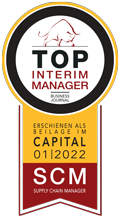

Richard Porstmann
Success stories in interim management: practical insights into challenging projects
Reading time: 8 minutes
Table of contents
As a seamless continuation of our last Insight article, which highlighted the importance of soft skills in interim management, we are now diving deeper into the world of real projects. Here we take a look at three demanding mandates in which I was confronted with a variety of challenges as an interim manager.
In each of these mandates, soft skills played just as important a role as professional expertise. They illustrate the importance of a holistic approach to interim management and emphasize the importance of soft skills for sustainable success.
Greenfield project in Brazil: new structure with lean principles
Goal
The aim of this mandate was to establish and manage a complete production and distribution site for hydraulic hoses in Brazil to serve the South American market.

Hurdle
The biggest challenge was to create something new from scratch, especially in a new country with all the associated bureaucratic hurdles. The completely new structure required a comprehensive understanding of the local conditions, from official requirements to cultural differences.
Success
Thanks to thorough planning in advance and the application of lean principles, efficient workflows were developed. The integration of ideas from colleagues led to a high level of efficiency at the plant. The material flow was optimized and the careful arrangement of the machines enabled smooth production. Lean principles such as continuous improvement and the elimination of waste played a decisive role in the success of this project.
Transformation in procurement & SCM: consolidation through social competence
Goal
The aim of this mandate was to identify and verify optimizations in purchasing and supply chain management, including the improvement of material availability and the development of the purchasing organization.
Hurdle
The restrictions imposed by the COVID-19 pandemic made personal interaction more difficult, which hampered team management and collaboration. Employees from different plants and regions, who previously hardly knew each other personally, suddenly switched to purely virtual communication, which further impaired interpersonal relationships and the flow of information.
Success
The team was brought together through targeted measures such as team-building activities and personality tests. In addition to formal meetings, informal gatherings such as dinners were used to establish a personal connection between the team members. These social and interpersonal components contributed significantly to the success of the project by strengthening trust and cooperation within the team. They also enabled effective communication and the exchange of ideas, which led to innovative solutions and improved performance.

Transformation in material management and operations: integrating the key players
Goal
The aim of this mandate was to increase the efficiency of the materials management organization by reorganizing the team and clearly assigning responsibilities and accountabilities.

Hurdle
One of the biggest challenges was getting the key players in the company on board and creating a clear understanding of the new way of working. This required not only identifying the most influential people, but also convincing them of the need for change.
Success
By identifying opinion leaders and multipliers and thus creating a committed core team, it was possible to motivate and support the other employees. These personal relationships strengthened cooperation and contributed significantly to the successful implementation of the reorganization. The involvement of key players and the clear communication of goals and responsibilities made it possible to overcome resistance and create broad acceptance for the changes.
I am also pleased to be able to add that, regardless of where my mandates have taken me, I am still in contact with most of the people with whom I have worked. This means that the personal relationship built up is not only limited to the period of the mandate, but also extends far beyond it.
Conclusions
- Successful interim management projects require comprehensive planning and the application of lean principles for efficient workflows.
- Social skills play a crucial role in overcoming challenges such as virtual collaboration during the pandemic.
- Personal relationships and informal meetings strengthen team spirit and promote success in complex projects.
- The identification and involvement of key players are crucial for the acceptance of changes and the successful implementation of reorganizations.
- Soft skills are just as important as technical skills and contribute significantly to sustainable success in interim management.
If you have any suggestions or thoughts on this topic, please write to me.






